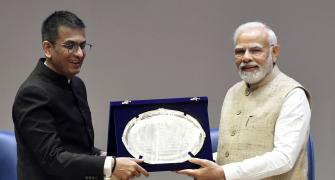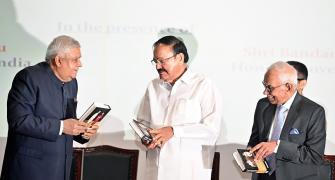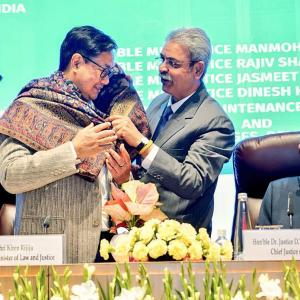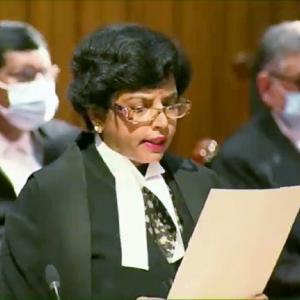The ability of judges to use the Constitution and judicial platforms for dialogues and deliberations is key to a stable society as in many societies across the world, the rule of law has given way to the rule of violence, Chief Justice of India D Y Chandrachud said.

He was speaking at the 3rd Comparative Constitutional Law discussion co-hosted by the Georgetown University Law Center, Washington and the Society for Democratic Rights (SDR), New Delhi and dealt with several issues relating to Indian judiciary.
He also spoke about the issue of polyvocality in the Supreme Court on various issues.
"In so many societies across the world, you will find that the rule of law has given way to the rule of violence... The key to a stable society is the ability of judges in that sense, to use the Constitution and their own platform as a platform for dialogue, as a platform for reason, as a platform for deliberation. And in so many cases that we decide including the case (same-sex marriages) that we have been speaking about. I think outcomes are important, but the process itself is as important as the outcome," he said.
The CJI also dealt with the principle of affirmative action by the state and said it was meant to achieve broader equality and was not against the right to equality.
"Now the argument against affirmative action in India, as well as in the United States, is that affirmative action detracts from merit and the argument against affirmative action is by having quotas in education, in employment and in political representation, you are essentially choosing people who are less meritorious, but this is an area which we have worked on considerably," he said.
"Because what do you really mean by equality itself? You can look at equality as a sense of formal equality, or do you look at equality as something more fundamental in substantive terms, because if you look at equality merely as formal equality, then by being colorblind, or by by being blind to the histories of discrimination, which our people have suffered, you're essentially giving weight to the social, cultural and economic capital, which the privileged have acquired over generations," he added.
In order to have a level playing field for those communities, who have suffered centuries of discrimination, affirmative state action is not an exception to equality, but is a reflection of the principle of substantive equality, he said.
He also dealt with the retirement age of judges in higher judiciary.
"In our high courts, we retire at the age of 62. And, in the Supreme Court, the Constitution tells us that we retire at the age of 65. Speaking for myself, I do believe in the importance of an age of retirement for judges," he said.
"I think it's important that we must allow and that is really in that sense of virtue of our system, that we allow succeeding generations of judges to assume the mantle of decision makers, and therefore to correct us if we were wrong," he said.
He also discussed the issue of difference in opinions in the apex court in its judgements and said the top court is a final court of appeal.
"We sit in larger panels of five or seven or more, when we are deciding important constitutional questions. I do believe that the polyvocality of our court, far from being a source of weakness, and is in a sense, is a strength to the institution...," he said.
He also referred to his judgement by which unmarried women were given abortion rights like married women.
"We have a law in India, which says that a woman can have a right of termination of pregnancy up to 22 weeks in certain circumstances, and that's extendable to 24 weeks for married women.
"Well, we struck down the distinction between unmarried and married women by saying that there's no rational distinction to distinguish between unmarried women who want to terminate the pregnancy and married women who are given the right to terminate pregnancy. So we extended the period from 20 to 24 weeks by applying the common yardstick to married as well as to unmarried women...," he said.









